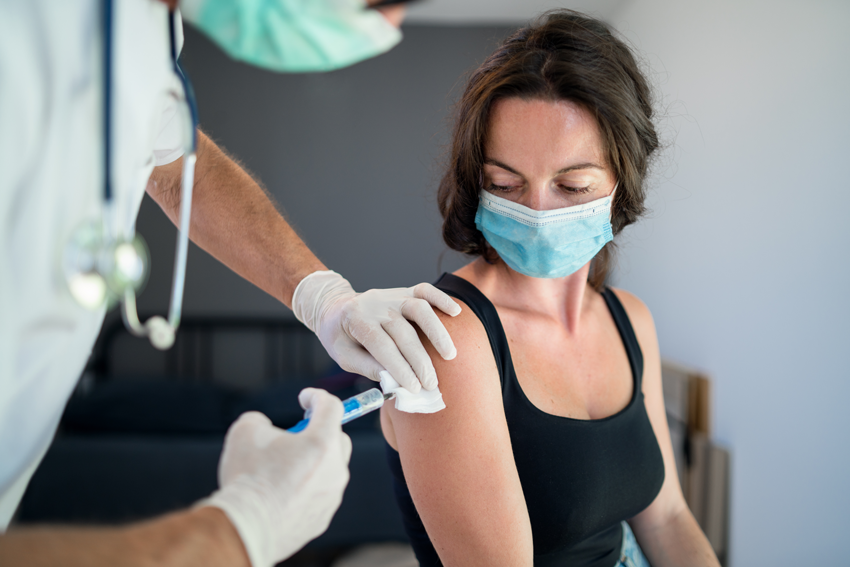The vaccine information below was updated on 1/29/21 to give information on COVID-19 vaccines made by Moderna and Pfizer only.
1. Why is vaccination important?
Vaccination is a safe and effective way to prevent disease. Vaccines save millions of lives each year. When we get vaccinated, we aren’t just protecting ourselves, but also those around us.
2. How do vaccines work?
Vaccines work by preparing the body’s immune system to recognize and fight off germs. They reduce your risk of getting a disease by working with your body’s natural defenses to build protection.
- Some vaccines contain dead or weakened versions of the
- Others contain substances made to look like part of the
- New mRNA vaccines (like the COVID-19 vaccines) teach the body to make proteins that look like part of the germ. (See the question “How do the COVID-19 vaccines work?” for more information).
- These types of vaccines do not cause the disease they are meant to
When you get a vaccine, your immune system responds. It:
- Makes Antibodies are proteins produced naturally by the immune system to fight disease.
- Prepares your immune cells to respond to future infection
- Remembers the disease and how to fight If you are exposed to the germ after getting the vaccine, your immune system can quickly destroy it before you become sick.
This is what makes vaccines so effective. Instead of treating a disease after it happens, vaccines can prevent us from getting sick in the first place.
3. How do the COVID-19 vaccines work?
The two COVID-19 vaccines that are offered in the United States are called mRNA vaccines. Our bodies use messenger RNA (mRNA) to make proteins.
- The mRNA in the vaccine is packaged inside tiny oily bubbles (known as lipid nanoparticles or LNPs).
- The mRNA enters the cells and teaches them how to make harmless pieces of “spike protein”. These
proteins look like part of the virus.
- Our immune system sees the spike protein pieces on the surfaces of our cells and knows that they
don’t belong there.
- Our bodies react by building an immune response. It makes antibodies that can act against the COVID-19 virus’s spike protein and it prepares immune This will protect us if we are exposed to the virus in the future.
4. Can you get COVID-19 from a vaccine?
No. After the mRNA teaches the cell to make the protein piece, the cell breaks it down and gets rid of it. mRNA does not enter the cell’s nucleus and mRNA vaccines do not affect or interact with our DNA (or genes) in any way.
The Moderna and Pfizer COVID-19 vaccines do not have the virus that causes COVID-19 in them. Sometimes people get a fever or feel tired for a day or so after getting a vaccine. These symptoms are normal and are a sign that the body is building immunity. You can learn more on the Understanding How COVID-19 Vaccines Work CDC website.
It usually takes a few weeks for the body to build full immunity after vaccination. If a person got infected with the virus that causes COVID-19 just before or just after they got the vaccine they could still get COVID-
- This is because the vaccine has not had enough time to provide protection.
5. Will getting the vaccine cause me to test positive on a COVID-19 test?
No. Vaccines won’t cause you to test positive on a PCR or antigen viral test (like the swab test) that looks for current COVID-19 infection. You may test positive on some antibody (blood) tests. This is because one of the ways that vaccines work is to teach your body to make antibodies.
See the public health testing webpage ph.lacounty.gov/covidtests to learn more about COVID-19 tests.
6. What are the side-effects of the COVID-19 vaccines?
You may get side-effects, like the ones after the flu vaccine or shingles vaccine. Side effects are more common after the second dose and in younger people. They usually do not last long, and you should feel better within a day or two. They may include:
- Fever and muscle aches
- Headache
- Feeling tired
- Sore or red arm
Side effects are normal and a sign that the vaccine is working. It shows your body is learning to fight a germ and build up immunity. It is important to get the second dose even if you get side effects after the first dose.
7. How many COVID-19 vaccines are there?
Around the world, over 50 COVID-19 vaccines are being tested in humans. Two vaccines are allowed in the United States so far. They are made by the companies, Pfizer and Moderna.
8. How many doses of COVID-19 vaccine will I need?
Most of the COVID-19 vaccines that are being tested are given in two doses a few weeks apart. It is important to get the same kind of vaccine for both doses.
The Pfizer vaccine is given as two doses 21 days apart. The Moderna vaccine needs 2 doses given 28 days apart. If you are late getting the second dose, you do not need to start over.
We don’t know how long the protection from the 2 doses of vaccine will last yet. This also means we don’t
know if you will need to get a booster dose in the future.
9. Will I have to pay to get a COVID-19 vaccine?
No. Your doctor or pharmacy may charge a fee for giving the vaccine, but it will be covered by public and private insurance companies. People without health insurance can get COVID-19 vaccines at no cost. There are no out-of-pocket payments.
10. Will I be asked about my immigration status when I get a COVID-19 vaccine?
No. COVID-19 vaccine is being given to Los Angeles County residents at no cost regardless of immigration status. You should not be asked about your immigration status when you get a COVID vaccine. Your medical information is private. Your doctor is not allowed to share it with immigration officials.
11. When can I get a vaccine?
The goal is for everyone to be able to get a COVID-19 vaccination easily as soon as large quantities of vaccine are available. While supplies are limited, vaccine is being offered to different groups of people at different times (or phases). Visit VaccinateLACounty.com to see which phase you are in, and when vaccines will be offered to each phase. You can also get updates by signing up for the Public Health COVID-19 vaccine email newsletter on this website.
12. When it is my turn, where will I be able to get the vaccine?
Vaccines will be given at:
- Primary care clinics
- Pharmacies
- Some workplaces
- Special vaccination sites run by Public Health and county, city, community, and healthcare partners
- Why do we need a vaccine if we can do other things, like social distance and wear masks? We need to do as much as we can to stop the pandemic. Vaccines boost your immune system so it will be ready to fight the virus if you are exposed. Other steps, like masks and social distancing, help lower your chance of being exposed to or spreading the virus. Together, these tools offer the best protection from COVID-19.
14. If I have already had COVID-19, do I still need to get vaccinated?
Yes, you do need the vaccine even if you have had COVID-19. We don’t yet know how long you are protected after you have had COVID-19, so it is important to have the vaccine to strengthen your immunity. It is safe to get the vaccine after getting COVID-19 but you should wait until after your isolation period is over. This is so that you don’t infect healthcare workers and others when you go to get vaccinated. If you have had monoclonal antibody treatment, you should wait for 90 days before getting a COVID-19 vaccine.
15. Can children get the COVID-19 vaccine?
No, people under the age of 16 cannot get COVID-19 vaccine at this time. There isn’t enough information available yet about the use of these vaccines in children. People age 16 and 17 can get the Pfizer vaccine. The Moderna vaccine is for people 18 and older.
16. Can people with weak immune systems get a COVID-19 vaccine?
Yes. Studies of the current COVID-19 vaccines did not include people with weak immune systems, so we don’t know how well the vaccine will work in these people. We do know that people with weak immune systems are at higher risk of getting COVID-19 if they are exposed to it. If they get COVID-19 they are more likely to become very sick. They are advised to talk to their doctor about getting the vaccine.
The studies did include people with stable HIV and people with active cancer and found that the vaccine was as safe and effective for this group as it was for other people in the studies.
17. Can people with allergies get a COVID-19 vaccine?
It depends. People who are allergic to things like food, pets, venom or pollen, or people who have a family history of allergies, can be vaccinated. But people who have had an allergic reaction to any ingredient in the mRNA COVID-19 vaccines or to polysorbate should not get vaccinated. People who are allergic to a vaccine or injectable therapy for another disease, should talk to their doctor to decide if it is safe for them to get vaccinated.
Information about allergic reactions may change. Be sure to check the latest guidance on the CDC COVID-19 Vaccines and Allergic Reactions webpage and talk to your doctor.
18. What is in the vaccines?
The Pfizer and Moderna COVID-19 vaccines contain mRNA, lipids (fats), salts, sugars and buffers. Neither vaccine contain eggs, gelatin, latex, or preservatives. For a full list of ingredients, please see each vaccine’s Fact Sheet for Recipients and Caregivers: Pfizer-BioNTech COVID-19 vaccine and Moderna COVID-19 vaccine.
19. Should I get a flu vaccine?
Yes! A flu vaccine only protects you from the flu, but at least it means you won’t run the risk of getting flu and COVID-19 at the same time. This can keep you from having a more severe illness. Getting a flu vaccine now is more important than ever. If you are likely to get the COVID-19 vaccine soon, ask your doctor about the best time to get the flu vaccine. This is because a COVID-19 vaccine should not be given within 2 weeks of other vaccines.
20. What can I do now to help protect myself from getting COVID-19 until it is my turn to get a vaccine?
To protect yourself and others, follow these recommendations:
- Cover your mouth and nose with a face covering when around others
- Avoid close contact with people who are sick
- Avoid crowds
- Stay at least 6 feet away from others
- Avoid poorly ventilated spaces
- Wash your hands
See guidance for reducing your risk. You should do this even after a vaccine.
21. Can I stop wearing a face covering once I am vaccinated?
No! It is important to continue to take precautions like washing hands, wearing face coverings and practicing physical distancing, even after you have had 2 doses of vaccine. This is because:
- The vaccine is 95% effective at preventing COVID-19 This is a really high level of protection for a vaccine, but it still means that 1 in 20 people who get the vaccine will not be protected.
- We don’t know how well the vaccine stops the actual virus from being Getting the vaccine
stops the disease from making you feel sick, but you might still be able to spread it to others.
- It takes up to 2 weeks after the last dose to get the best
If you get COVID-19 after you have been vaccinated, you still need to isolate. And, if you have been in close contact with someone with COVID, you need to quarantine even if you have been vaccinated.
Stopping this pandemic is going to take all our tools.





